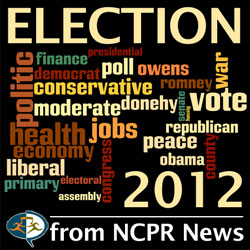Is Paul Ryan the new Ronald Reagan, or the new Barry Goldwater?
84 days to the 2012 election
Mitt Romney’s pick of conservative budget-meister Paul Ryan to be his VP running mate puts liberals and moderates in both political parties on notice.
If the Romney-Ryan team prevails, voters will have embraced a set of ideas and policies that would literally change America.
A week ago, it seemed like the contest was between two fairly temperate defenders of the post-World War 2 consensus about our politics and society.
Quibbles aside, we would be remain a capitalist democracy where the government accounts for about a fifth of the overall economy and plays a big role in all our lives.
Big social safety net programs would need reform and tweaking — a view that Romney and Barack Obama clearly share — but no one was questioning their purpose or their fundamental validity.
It’s telling that Romney and Obama came up with nearly identical solutions (Romneycare and Obamacare) to the health insurance crisis that faced them both during their time as executives.
But Paul Ryan is the intellectual architect of the conservative latest counter-reformation.
He has taken the conservative concept that government is an essentially corruptive force — inspiring laziness, dependency and corruption — and translated it into a sweeping budgetary proposal.
Budgets, as someone or other famously said, translate ideas and policy into action. This is where lofty ideas get their grit and muscle.
If voters do embrace this vision, it will be a tipping point as profound as 1980, when voters embraced Ronald Reagan’s vision of America.
“Government isn’t the solution,” Reagan argued. “Government is the problem.” When it comes to the social safety net (as opposed to, say, military spending) Ryan’s spending plan takes Reagan at his word.
But we live in a very different age from 1980. Income tax rates are already far lower. The conservative movement’s ideas are far better known in full than they were in those days. The country is more polarized.
It’s also true that far more people rely (apparently without qualm) on the government for some form of financial support, ranging from Social Security to Medicare and Medicaid to food stamps and rent support.
The danger for the GOP is that voters will instead react to Ryan’s nomination the way they reacted to Barry Goldwater’s right-of-center campaign in 1964.
Like Ryan today, Goldwater laid out explicitly how he would downsize government — he didn’t simply talk in broad bromides. Voters got a clear picture of his conservative vision and they rejected Goldwater overwhelmingly.
In the online magazine Politico, some GOP pundits are already speculating that the choice of Ryan could either save the Romney campaign, lifting it to a narrow win, or the VP pick could lead to a big defeat.
If enough Florida’s seniors, for example, decide that the Republican ticket is just too nerve-wracking — at a time when the economy has already been jittery enough — another big state could slip beyond reach.
A narrow Democratic victory in November could very plausibly turn into a 332-191 blow-out in the Electoral College. That could have all kinds of implications, affecting House races, and the contest for control of the US Senate.
So what’s the right metaphor here? Have Republicans opened the door to the future of their party, as they did in 1980? Or have they found a formula for election night disaster, as they did in 1964? Your comments welcome.
Tags: analysis, election12, politics









and this article today has some interesting statistics:
http://www.marketwatch.com/story/why-go-to-college-if-i-cant-get-a-job-2012-08-23?siteid=rss&rss=1